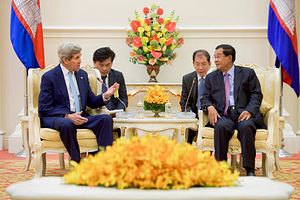The United States must put human rights first in its relationship with Cambodia, an opposition lawmaker told an audience in Washington, D.C. Wednesday.
U.S.-Cambodia relations have been in the spotlight in recent weeks, with U.S. Secretary of State John Kerry visiting Phnom Penh in late January where his discussions with officials including Prime Minister Hun Sen included boosting bilateral economic ties as well as human rights and democracy concerns. Cambodian officials have been looking for opportunities to further open U.S. markets to Cambodian exports, particularly with the country being left out of the U.S.-led Trans-Pacific Partnership which could erode its competitiveness. Hun Sen will also be attending a special U.S.-ASEAN leaders’ summit in Sunnylands, California later this month.
But Chamroeun Nhay, one of two opposition members of parliament (MPs) who were dragged from their vehicles and savagely beaten outside the National Assembly last October at a protest led by a group aligned with the ruling Cambodian People’s Party (CPP), said that Washington should ensure that the Cambodian government respects rights before attempting to boost ties with the country, including through greater trade and investment.
“Before they sign anything, focus on human rights first,” he said in response to a question from The Diplomat at the event organized by Young Professionals in International Affairs.
Addressing a crowd with fellow Cambodian National Rescue Party (CNRP) MP Sophea Kong who had also been beaten, Chamroeun said that the rights situation in Cambodia had gotten worse recently, with authorities shooting dead at least five garment workers in early 2014 during fighting over rights, the attack on the two MPs last October, and the current assault on opposition leader in exile Sam Rainsy (See: “Interview: Cambodia’s Political Turmoil and Future Prospects”). The October 2015 attacks left Chamroeun with a double arm fracture, broken nose, chipped teeth and several facial injuries.
“Don’t listen much to what they say, but look at what they have done,” he said. “It’s worse.”
Last month, Hun Sen’s younger son Hun Many, a lawmaker from the CPP who serves with Chamroeun on several legislative committees, told an audience in Washington, D.C. that these data points were concerning but ultimately presented an incomplete picture of Cambodia which did not acknowledge the successes of the ruling party (See: “Cambodia’s Hun Many Calls for Stronger US Ties”).
While Chamroeun admitted that stronger U.S.-Cambodia economic ties could help Cambodian workers at home and flow of Cambodian youth out of the country, he said that labor conditions and worker rights remain key areas of concern which need to be addressed.
“[T]he problem is that…worker[s] in Cambodia do not get treated well,” he said. “They cannot demand anything much usually without [getting] shot or killed.”
He said that the opposition had conveyed to Kerry during his visit that though any economic agreement might be good for Cambodia, it should respect human rights and labor rights.
In addition, with commune elections set for 2017 and national elections in 2018, he said that the United States should work to ensure that elections in Cambodia are free and fair so that the people can have their voice heard.
“We want the Obama administration to help [ensure that] at least Cambodians [can] exercise their rights,” he said. “Make sure that elections [are] free and fair,” he said.

































